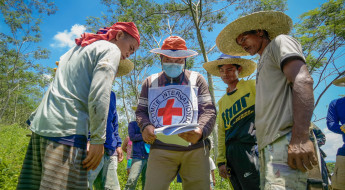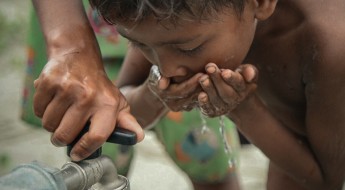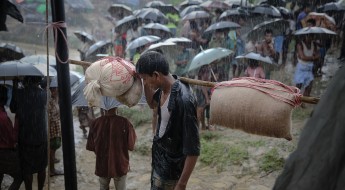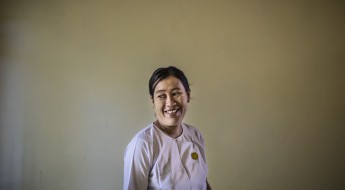Myanmar: One year on, struggles far from over for people of Rakhine
 When violence peaked last year, it was common to see families waiting at Alal Than Kyaw beach in Maungdaw, eager to cross over to Bangladesh.CC BY-NC-ND / ICRC / Hla Yamin Eain
When violence peaked last year, it was common to see families waiting at Alal Than Kyaw beach in Maungdaw, eager to cross over to Bangladesh.CC BY-NC-ND / ICRC / Hla Yamin Eain In the first few weeks, hundreds of tonnes of food and aid supplies were shipped from Yangon to Maungdaw.CC BY-NC-ND / ICRC / Hla Yamin Eain
In the first few weeks, hundreds of tonnes of food and aid supplies were shipped from Yangon to Maungdaw.CC BY-NC-ND / ICRC / Hla Yamin Eain Local women from Rakhine were among those helping with emergency aid material.CC BY-NC-ND / ICRC / Hla Yamin Eain
Local women from Rakhine were among those helping with emergency aid material.CC BY-NC-ND / ICRC / Hla Yamin Eain Engaging with people and seeking their feedback have been helping us better address the needs of the community.CC BY-NC-ND / ICRC / Indu Nepal
Engaging with people and seeking their feedback have been helping us better address the needs of the community.CC BY-NC-ND / ICRC / Indu Nepal Many people have had restricted access to markets and the majority of shops have shut down, leaving families with little or no income. So far, we have assisted 280,000 people with food, water and other essential items such as hygiene material and dignity kits.CC BY-NC-ND / ICRC / Hla Yamin Eain
Many people have had restricted access to markets and the majority of shops have shut down, leaving families with little or no income. So far, we have assisted 280,000 people with food, water and other essential items such as hygiene material and dignity kits.CC BY-NC-ND / ICRC / Hla Yamin Eain Daw Ma Aye Sein and her village received farm seeds and fertilizers to help them grow their own food. Tomato seeds were her favourite.CC BY-NC-ND / ICRC / Hla Yamin Eain
Daw Ma Aye Sein and her village received farm seeds and fertilizers to help them grow their own food. Tomato seeds were her favourite.CC BY-NC-ND / ICRC / Hla Yamin Eain Mobile health clinics play a crucial role in remote areas. Many facilities have been set up to make health care more accessible. Our team also provides medical supplies and equipment to rural centres in Maungdaw.CC BY-NC-ND / ICRC / Lin Hnin Aye
Mobile health clinics play a crucial role in remote areas. Many facilities have been set up to make health care more accessible. Our team also provides medical supplies and equipment to rural centres in Maungdaw.CC BY-NC-ND / ICRC / Lin Hnin Aye The monsoons have made access to many villages and camps in Rakhine State extremely difficult.CC BY-NC-ND / ICRC / Indu Nepal
The monsoons have made access to many villages and camps in Rakhine State extremely difficult.CC BY-NC-ND / ICRC / Indu Nepal Makeshift shelters are too fragile for the heavy rain and strong winds, making daily life a struggle. To help people tide over the season, the food rations have been doubled.CC BY-NC-ND / ICRC / Lin Hnin Aye
Makeshift shelters are too fragile for the heavy rain and strong winds, making daily life a struggle. To help people tide over the season, the food rations have been doubled.CC BY-NC-ND / ICRC / Lin Hnin Aye Like many others, Ma Than Win, a young mother was able to strengthen her home in the remote islands of Pauktaw, where members of the community were also trained in carpentry to build monsoon-resistant structures.CC BY-NC-ND / ICRC / Hla Yamin Eain
Like many others, Ma Than Win, a young mother was able to strengthen her home in the remote islands of Pauktaw, where members of the community were also trained in carpentry to build monsoon-resistant structures.CC BY-NC-ND / ICRC / Hla Yamin Eain Months after being separated from her family, this inmate was able to find her children in a camp in Cox's Bazar, Bangladesh. Hundreds of separated families have been reunited with the help of tracing requests and Red Cross messages. A year on, our commitment remains strong.CC BY-NC-ND / ICRC / Etienne Chenier-Lafleche
Months after being separated from her family, this inmate was able to find her children in a camp in Cox's Bazar, Bangladesh. Hundreds of separated families have been reunited with the help of tracing requests and Red Cross messages. A year on, our commitment remains strong.CC BY-NC-ND / ICRC / Etienne Chenier-Lafleche
One year ago, on 25 August 2017, violence erupted in the northernmost part of Rakhine State and continued in the weeks and months that followed. All communities were directly or indirectly affected and many people were displaced within the State. Since then, more than 720,000 have fled across the border to Bangladesh and the impact of the violence continues to be felt by those who remain.
Since the beginning of the crisis, the Red Cross Movement has provided humanitarian assistance in northern areas of Rakhine. Altogether more than 280,000 people have received food, water, household items, health-care services, cash grants and livelihood assistance.
Through regular visit of prisons, we monitor and help improve the treatment of detainees and the conditions of detention. We have also collected more than 2,000 Red Cross messages from both sides of the border to restore communication between detainees and their relatives.
Humanitarian needs in Rakhine State are high. This is a protracted crisis and we are committed to assisting long-term, because meeting essential needs among communities, strengthening their resilience and supporting their livelihood will increase the chance of peace and stability being restored.




